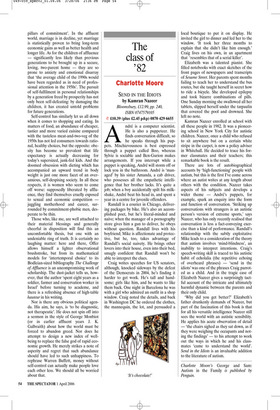The class of ’82
Charlotte Moore
SEND IN THE IDIOTS by Kamran Nazeer Bloomsbury, £12.99, pp. 240, ISBN 0747579105 ✆ £10.39 (plus £2.45 p&p) 0870 429 6655 André is a computer scientist. He is also a puppeteer. He finds conversation difficult, so he speaks through his puppets. Mischievousness is best expressed through a puppet called Boo, whereas Sylvie is sociable and Ben-Gurion makes arrangements. If you interrupt while a puppet is speaking, André will storm off or lock you in the bathroom. André is ‘managed’ by his sister Amanda, a cab driver, who possesses all the empathetic intelligence that her brother lacks. It’s quite a job; when a boy accidentally spilt his milkshake, André beat his head in, and spent a year in a centre for juvenile offenders.
Randall is a courier in Chicago, delivering packages by bike. He’s also an accomplished poet, but he’s literal-minded and naive; when the manager of a pornography store gives him a gun to deliver, he obeys without question. Randall lives with his boyfriend; Mike is affectionate and protective, but he, too, takes advantage of Randall’s social naivety. He brings other lovers into their house, even into their bed, smugly confident that Randall won’t be able to interpret the clues.
Craig writes speeches for US senators, although, knocked sideways by the defeat of the Democrats in 2004, he’s finding it harder to get work. He’s tall and handsome; girls like him, and he wants to like them back. One night in Barcelona he was with a girl who admired an outfit in a shop window. Craig noted the details, and back in Washington DC he ordered the clothes, the mannequin, the lot, and persuaded a local boutique to put it on display. He invited the girl to dinner and led her to the window. ‘It took her three months to explain that she didn’t like him enough.’ Craig lives on his own, in an apartment that ‘resembles that of a serial killer’.
Elizabeth was a talented pianist. She filled notebooks with exact sketches of the front pages of newspapers and transcripts of Sesame Street. Her parents spent months failing to teach her to understand the bus routes, but she taught herself in secret how to ride a bicycle. She developed epilepsy and took bizarre combinations of pills. One Sunday morning she swallowed all her tablets, slipped herself under the tarpaulin that covered the pool and drowned. She left no note.
Kamran Nazeer enrolled at school with all these people in 1982. It was a pioneering school in New York City for autistic children. Nazeer, once a child who refused to sit anywhere but on a certain white stripe in the carpet, is now a policy adviser in Whitehall. He decided to trace his former classmates and their teachers; this remarkable book is the result.
There are lots of autobiographical accounts by ‘high-functioning’ people with autism, but this is the first I’ve come across where an autist writes at any length about others with the condition. Nazeer takes aspects of his subjects and develops a wider theme — André’s puppets, for example, spark an enquiry into the form and function of conversation. ‘Striking up conversations with strangers is an autistic person’s version of extreme sports,’ says Nazeer, who has only recently realised that conversation is less a fact-conveying exercise than a kind of performance. Randall’s relationship with the subtly exploitative Mike leads to a consideration of the theory that autism involves ‘mind-blindness’, an inability to interpret intentions. Craig’s speech-writing skill is traced to his autistic habit of echolalia (the repetitive echoing of overheard phrases) — ‘send in the idiots’ was one of the phrases Craig parroted as a child. And in the tragic case of Elizabeth Nazeer gives a surprisingly tactful account of the intricate and ultimately harmful dynamic between the parents and their only child.
‘Why did you get better?’ Elizabeth’s father drunkenly demands of Nazeer, but part of the fascination of this book is that for all his versatile intelligence Nazeer still sees the world with an autistic sensibility. He applies his acute observation of detail — ‘the chairs sighed as they sat down, as if they were weighing the occupants and noting the findings’ — to his attempt to work out the ways in which he and his classmates ‘came to understand the world’. Send in the Idiots is an invaluable addition to the literature of autism.


























































































 Previous page
Previous page